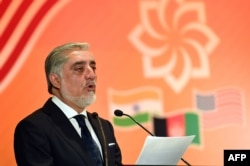Afghan President Ashraf Ghani launched long-delayed electronic citizen ID cards Thursday, but his governing partner, Chief Executive Abdullah Abdullah, boycotted the ceremony and questioned the legitimacy and timing of the process.
The president and first lady Rula Ghani, along with several top officials, received their ID cards, locally known as “e-tazkiras,” marking the formal rollout at a special ceremony in Kabul.
The existing national ID cards are made of paper and, officials say, are highly prone to tampering and fraud. President Ghani reiterated those concerns at Thursday’s ceremony.
“An important reason for launching this card is that terrorists have taken advantage of the paper ID card, endangering security of all our countrymen, and protecting lives and property of Afghans is the fundamental responsibility of the government,” Ghani said.
Ghani also said the digitized national ID card is an essential and crucial step toward better governance, economic development, transparency and delivery of services.
Not everyone is happy with the electronic card. The document identifies its holder as “Afghan,” which some critics say is used to denote the country’s majority ethnic Pashtuns. However, President Ghani, an ethnic Pashtun, defended the card, saying it represents every Afghan ethnic group.
Some within the Dari-speaking Tajiks, the country's second largest ethnic group, are leading the opposition to the new ID cards.
Shortly after Ghani introduced the digitized cards, Chief Executive Abdullah, also a Tajik, addressed a news conference to reiterate his reservations and rejected what he said was a one-sided decision.
“The reason I have not participated in distribution of e-tazkiras is that I know this process lacks legitimacy and support from the Afghan people... It will lead to to crisis and more problems,” Abdullah warned. Abdullah, however, went on to say he was not among those questioning the use of the term "Afghan" on the new card.
"I as an Afghan am proud of my identity as a Muslim and Afghan. I know there are individuals and groups that are preaching the message that I am against certain words being mentioned in e-tazkira. This is completely false."
Abdullah explained he was not opposed to electronic ID cards for Afghans but the timing of its launching was not right.
President Ghani had intended to enable Afghans to use e-tazkira cards in the October 20 parliamentary and district council elections to deter fraud and rigging. But the plan was abandoned in the wake of technical delays and political differences over including ethnicity and nationality on the card. Afghan voters will be using the old paper cards for the October polls.





